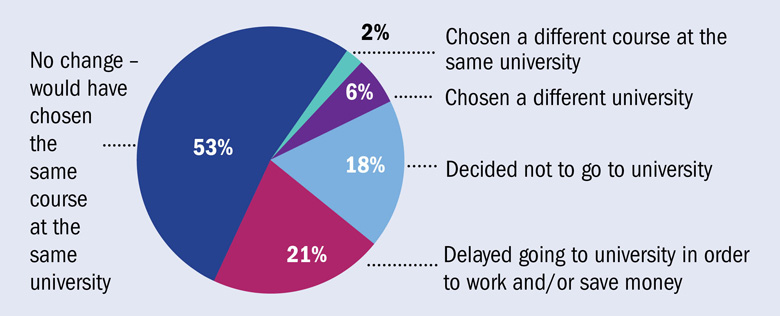The loss of student maintenance grants this autumn is likely to force thousands more undergraduates to live at home and take longer hours of paid work, a survey suggests.
Many young people may also choose a different course or institution, delay their studies for a year or not study at all thanks to the abolition of student grants of up to £3,387 for new entrants from September, the YouthSight poll of current students also reveals.
About 1,000 undergraduates from low-income backgrounds who currently receive a grant were asked how the loss of this support would have affected their attitude towards applying to university or behaviour on campus as part of the 2016 Sodexo University Lifestyle Survey.
The latest biannual survey was undertaken by the service provider in association with Times Higher Education, polling about 2,000 students about different aspects of campus life.
Asked how the loss of their maintenance grant would have influenced their approach to university, almost half (47 per cent) of grant holders – who currently number 500,000 nationally – say that it would have had some impact.
About one in five (21 per cent) say that they would have delayed their studies for a year in order to work and save money, while 18 per cent state that they would not have gone to university at all.
Some 6 per cent would have chosen a different university and 2 per cent would have chosen a different course but at the same university, although 53 per cent say that it would have had no impact on their decision at all.
Asked how they would have managed as a student without a grant, about a third (31 per cent) of respondents would have taken on more work in the holidays and 29 per cent would have taken more part-time work in term-time.
Some 18 per cent would have chosen cheaper accommodation and 8 per cent would have stayed at home. A third (33 per cent) say that they would have taken up the higher living cost loans that will replace grants following the announcement by chancellor George Osborne on the funding changes in last year’s Budget.
Students estimate impact of grant loss:
How would loss of grants have affected your decision about university?

Nick Hillman, director of the Higher Education Policy Institute, said that ministers and universities needed to be wary of the impact of scrapping grants on student behaviour, despite university application rates for this year holding up well.
“I am not a big fan of the complete shift from grants to loans as, when Tony Blair did the same thing in 1998, it had a negative effect on widening participation,” said Mr Hillman.
“We have a precedent for doing this when fees were just £1,000 which was not a success,” he added, explaining that maintenance grants were reintroduced in 2004 to halt a fall-off in participation rates.
While he remained sceptical of whether results in such polls would match future student behaviour, it would be particularly concerning if poorer undergraduates were required to take on significant amounts of paid work in term-time.
“Working a few hours in a bar or on campus has actually been shown to help your academic studies as it makes you more organised, but if students do 20 hours a week this will have a negative impact,” he added.
Neil Harrison, senior lecturer in education at the University of the West of England, who has studied student bursaries, said that it was likely that “some will be discouraged by the loss of the grant, but we don't yet know how many".
However, demand for higher education was likely to remain buoyant “largely because of the dearth of other high-quality opportunities for young people”, who have been shown to be “resilient…to previous rises in the cost of studying”, Dr Harrison said.
“However risky higher education seems, the alternative is riskier still,” he added.
POSTSCRIPT:
Print headline: Thousands more students ‘likely to work as grants end’
Register to continue
Why register?
- Registration is free and only takes a moment
- Once registered, you can read 3 articles a month
- Sign up for our newsletter
Subscribe
Or subscribe for unlimited access to:
- Unlimited access to news, views, insights & reviews
- Digital editions
- Digital access to THE’s university and college rankings analysis
Already registered or a current subscriber? Login




